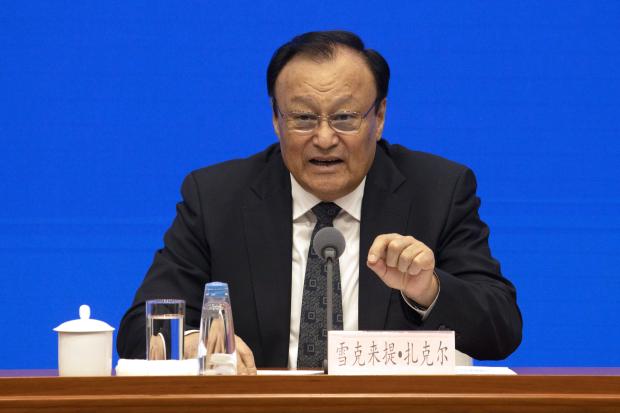
Shohrat Zakir, chairman of China’s Xinjiang Uighur Autonomous Region speaks during a press conference in Beijing Monday, Dec. 9, 2019. (Photo by Ng Han Guan / AP)
BEIJING — People who were at vocational training centers in China’s far west Xinjiang have all “graduated” and are living happy lives, an official said Monday. But Uighurs and other predominantly Muslim ethnic minorities from the region say their family members continue to be arbitrarily detained in camps and prisons.
Shohrat Zakir, Xinjiang’s Uighur governor, made the remarks during a press briefing as part of a strident propaganda campaign launched following U.S. Congress’ approval last week of the Uighur Human Rights Policy Act.
“When the lives of people of all ethnic groups in Xinjiang were seriously threatened by terrorism, the U.S. turned a deaf ear,” Zakir said at a press briefing. “On the contrary, now that Xinjiang society is steadily developing and people of all ethnicities are living and working in peace, the U.S. feels uneasy, and attacks and smears Xinjiang.”
The U.S. legislation condemns the mass detentions of an estimated more than 1 million Uighurs, Kazakhs and others. It also raises possible sanctions against Chinese government officials deemed responsible for human rights abuses in Xinjiang.
READ: Secret documents reveal how China mass detention camps work
Former detainees and their relatives have told The Associated Press that the centers for “re-education” were essentially prisons where they were forced to renounce Islam and express gratitude to the ruling Communist Party. They were subject to indoctrination and torture, the detainees said.
While Chinese authorities have described the detentions as a form of vocational training, classified documents recently leaked to a consortium of news organizations revealed a deliberate strategy to lock up ethnic minorities even though they had not committed any crimes.
Xu Hairong, the Communist Party chief of Urumqi city, Xinjiang’s capital, did not dispute the documents’ authenticity. He said, however, that there was no such thing as “detention camps.”
“The reports by The New York Times, the International Consortium of Investigative Journalists and other foreign media organizations are purely malicious attempts to smear and discredit Xinjiang’s vocational education centers and its counter-terrorism and de-radicalization efforts,” Xu said.
Officials have repeatedly declined to say how many people are in the centers but insist the figure is far less than 1 million. Zakir said Monday the number is “dynamic.”
All those in the centers who were studying Mandarin Chinese, law, vocational skills and deradicalization have “graduated” and found stable employment, Zakir said, adding that others such as village officials, farmers and unemployed high school graduates continue to enroll on a rolling basis in programs that allow them to “come and go freely.”
Some ex-detainees have told AP they were forced to sign job contracts and barred from leaving factory grounds during weekdays, working long hours for low pay. Many Uighurs abroad also say their relatives are in prison, not camps, after being sentenced on vague charges of extremism.
Monday’s briefing was the latest in a slew of public rebuttals from the Chinese government in response to the U.S. Uighur human rights bill, which Beijing has called a violation of international law and interference in China’s internal affairs.
The legislation further muddied U.S.-China ties, which were already strained over trade and pro-democracy demonstrations in Hong Kong.
During the briefing, officials played a clip from a documentary released last Friday by CGTN, the international branch of state broadcaster CCTV.
The documentary, called “Fighting Terrorism in Xinjiang,” showed old footage of terrorist attacks over the last decade, including bombings and stabbings such as the knife attack that killed 31 people outside a railway station in southern Kunming city in 2014.
/atm